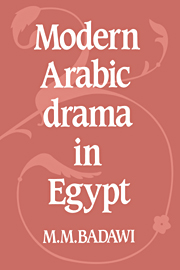Summary
It is an established fact that modern Arabic drama was borrowed from the West independently by Mārūn al-Naqqāsh in the Lebanon in 1847 and by Yaʿqūb Ṣannūʿ in Egypt in 1870. Both men had been inspired by the example of Italian opera (which they had seen in Italy) and influenced by European drama, particularly French comedy. Yet the Arab world did have certain indigenous types of dramatic representation at the time, some even going back to medieval Islam. These traditional types determined to some extent the manner in which the imported form was conceived and subsequently developed, and they continued to exist side by side with it for some time. They were, to begin with, dramatic recitations by rhapsodes, accompanied by simple string instruments, of popular medieval romances composed in a mixture of verse and prose, half narrative and half dramatic, such as Abū Zayd al-Hilālī and Baybars, fully described by Edward William Lane in The Manners and Customs of Modern Egyptians (1836). Closer to drama in some ways was the annual cycle of Passion Plays (taʿziya) commemorating, sometimes in lurid, realistic detail, the massacre of al-Ḥusayn, the son of the fourth Caliph 'Alī, and his family by the ruling house of the Umayyads in the battle of Karbala (in 680). This type of folk drama was performed by Shi'ite Muslims (followers of the house of 'Ali), generally in Persian; but some have been done in Turkish and Arabic.
- Type
- Chapter
- Information
- Modern Arabic Drama in Egypt , pp. 1 - 7Publisher: Cambridge University PressPrint publication year: 1988

